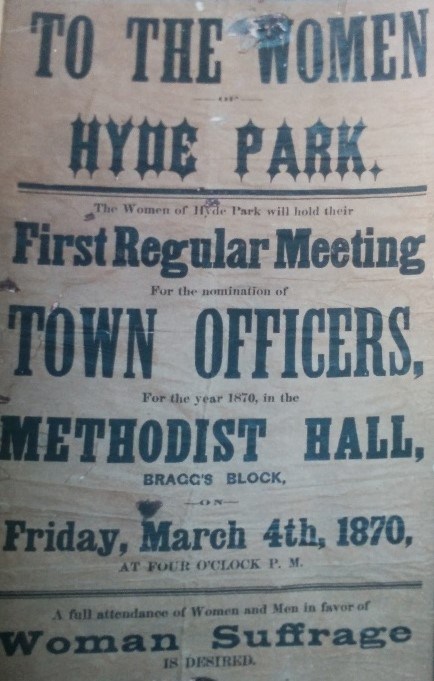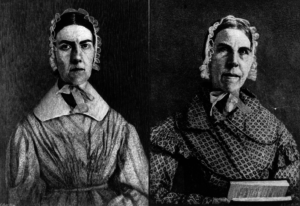
In March 1870, fifty years before the 19th amendment granted women citizens in the US the right to vote, a bold group of women from Hyde Park, voted in a local election. Their march and vote was the first in Massachusetts and the publicity it garnered would galvanize many more across the country.
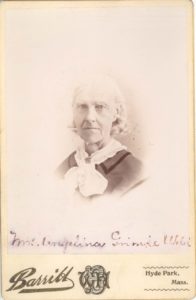
Angelina Grimke Weld and Sarah Grimke, sisters who actively fought for abolitionism, had moved to Hyde Park after the Civil War. After the 13th Amendment outlawed slavery, the sisters focused their activism on securing rights, both political and social, for women. In January 1870, the Massachusetts Womens Suffrage Association was founded and the Grimke sisters were elected as vice presidents. In February of that year, Lucy Stone gave a powerful lecture in Hyde Park and a discussion followed featuring the Grimke sisters and Theodore Weld. The group present determined that action was needed. They would lead the women of Hyde Park not only to organize and speak out for women’s suffrage, but to vote in the upcoming local election.
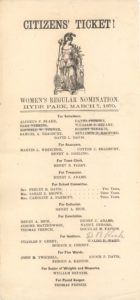
On Monday, March 7, 1870 a group of approximately 50 women including the Grimké sisters and Sarah M. Stuart, turned out on election day and cast their votes. The votes were placed in a separate box and local officials did not count the women’s ballots. But women’s collective action–showing up and voting–brought widespread attention to their demands for political rights. It also helped inspire another generation of women to continue the fight. The women’s ballots were saved and are in the collection of the Hyde Park Historical Society. They represent a valuable piece of our local women’s history.
Below are reports of the march and vote from, A Memoir of Sylvanus Cobb, Jr. By Ella Waite Cobb. Published 1891.
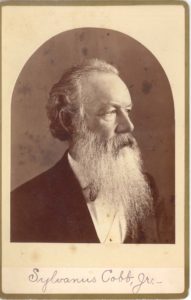
Sylvanus Cobb, jr was often chosen moderator of town meetings and filled that position at the memorable meeting of March 7, 1870, when the women were allowed to cast their vote. For this date his diary contains the following entry.
At our annual town meeting I was elected moderator and had a hard time of it. Late in the afternoon our female friends who had gathered at the Everett House for the purpose of voting, came over in a body and deposited their votes in a box prepared for them, forty seven in all. There was much excitement in the hall which was packed and I had great difficulty in maintaining order but I did it. The event has created universal interest and comment, the first of the kind in the country. I have taken my stand for woman’s suffrage and am proud of it.
The affair received wide spread newspaper comment and the New York Herald reported it as follows.
The women succeeded in voting in Hyde Park Mass yesterday at the town election. They put a separate ticket in the field and about sixty of them voted for it. They came in a body to the polling place with bouquets and cotton umbrellas in their hands and a modest determination in their countenances, some of them old and gray headed, and many of them young and pretty. Their presence, which should have cast a benign influence over the unhallowed precincts which heretofore had been accessible to men and the vile odors of rum and tobacco, was the occasion of hisses on the part of some of the disorderly men in the crowd. But the women had a staunch defender in Sylvanus Cobb Jr, who stood up for them with the gallantry and daring of the old Spanish knights or Muscovian gun makers that he writes about in the Ledger. He cast upon the disturbers one look of his eagle eye. “Base ruffians“ he cried in thunder tones, “think ye to bar the way of these fair dames to yonder ballot box. By my halidom these women shall vote or perish in the attempt.” These brave words had their effect and the gallant women voted and more than that, although their votes were counted out, their ticket was elected.
The following extracts, are from the local paper, Norfolk County Gazette.
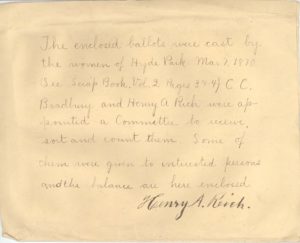
The delay of the women in making their appearance led to the rumor that their courage had failed them and the anti female suffrage masculines were in high glee. Their joy however soon turned to sorrow, for in a few moments Mr Sylvanus Cobb Jr received a delicately written note and proclaimed its contents in a loud and eloquent tone. Mr Cobb said that he did not wish to interfere with the business of the meeting or to interrupt the gentlemen who were voting, but he would suggest that, if there were any friends of universal suffrage in the hall, it would be gallant for them to go over to the Everett House and escort the ladies hither. Some of the gentlemen present, Mr Cobb said, might have wives daughters or mothers among the number and he hoped that for this reason, if for no other, the ladies would be treated decorously. They only asked the favor of coming over, perhaps more than anything else for the purpose of drilling themselves in the form of casting the ballot and thus preparing for the great duty and obligation which would with the help of God at no very distant day be conferred upon them. Their votes he said of course would not be counted and would have no influence, for or against the election. He then again expressed the hope that the ladies would be treated with civility and respect, at which there were affirmative responses and cheers mingled with a few hisses. When Mr Cobb had finished his few remarks the eyes of all were turned towards the door to witness the grand entree of the coming women. The suspense was only momentary for there soon appeared a couple of elderly dames whose frosty locks had seen seventy or eighty summers and as many winters. The crowd meanwhile became noisy and demonstrative in the extreme. Some cheered some groaned some hissed and all united in making as much noise and confusion as possible. Just as the confusion seemed bordering on a riot and as the strong minded women were becoming timid, Mr Cobb with determination in his countenance declared in a loud stentorian tone, that unless order were maintained he would have certain men arrested. Then looking in the direction from whence the disturbance originated pointing his finger in a Websterian manner, he said in a tone at once sarcastic and full of rebuke, “Ain’t you ashamed of yourselves. Do you think you are acting like men? We will forgive you for all this if you will now try and behave like orderly gentlemen.” These words of the Ledger novelist so determined and unmistakable in their meaning were momentarily effective and the voting of the women was resumed. But almost instantly there was a sound of groans and hissing which of course justly excited the ire of Mr Cobb. He advised them, as they pretended to have opinions of their own, to respect the opinions and actions of others, adding that if there were any men in the hall who would attend church next Sunday, they would probably have an opportunity to see some of the same ladies whom they were insulting, and he hoped for the credit of the town, that they would discontinue such unbecoming conduct as they had been guilty of. One man in the crowd replied that he thought Mr Cobb as moderator of the meeting had no right to criticise the action of those who were opposed to female suffrage, even if they manifested it and he therefore would move that he be requested to resign. Mr Cobb said that he had the same right to show his sympathies that others had and he should exercise the right as an individual and furthermore that he should endeavor as moderator to preserve order. While all this discussion was going on the women were very quietly depositing their ballots, and when they had ended, the polls were declared closed and there was therefore no occasion for further disturbance.
Written and edited for the web by Patrice Gattozzi and Peter Brown

